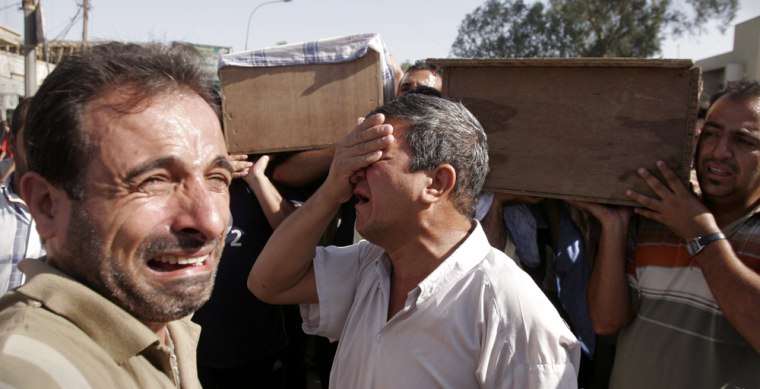Car bombs killed eight people in a Shiite slum and gunmen mounted a deadly ambush on a bus in a Sunni area of the capital Monday as Iraq’s sectarian violence showed no sign of easing.
The coordinated bombing attack in Baghdad’s Sadr City began at midmorning when a car exploded near a repair shop. Minutes later, a suicide bomber blew up his vehicle in a crowd of curiosity-seekers who were milling around the first blast site, witnesses and police said.
In addition to the dead, 41 people were wounded, most of them in the second blast, police said.
Hours later, gunmen attacked a bus in the predominantly Sunni neighborhood of Amariyah in western Baghdad, killing the driver and six passengers, including a woman, police Capt. Jamil Hussein said. The attackers set fire to the bus before fleeing.
The bombings in Sadr City may have been a reprisal for an attack Sunday in west Baghdad’s Jihad neighborhood, where Shiite gunmen rampaged through the streets, stopping people, checking identification cards and killing people with clearly Sunni names.
Prime Minister Nouri al-Maliki appealed Monday for unity, telling the Kurdish regional parliament in the northern city of Irbil that it is “our destiny to work together to defeat terrorism.”
But there was no let-up in communal violence.
Late Monday, gunmen believed to be Shiites blocked streets in the mostly Sunni area of Ghazaliyah and opened fire at a Sunni mosque, police said
A bomb exploded earlier in an outdoor market in central Baghdad, killing three people and wounding 18, police Col. Adnan al-Obeidi said. Gunfire also erupted in the religiously mixed Dora district of southwestern Baghdad, where local authorities imposed a curfew.
Bomber kills 5 in Kirkuk
In the northern city of Kirkuk, a suicide truck bomber attacked an office of President Jalal Talabani’s political party, the Patriotic Union of Kurdistan, killing five people and wounding 12, police said.
A roadside bomb killed a policeman and wounded four people in the Shiite city of Hillah in southern Iraq. Also in the south, a former major general under Saddam Hussein was assassinated in Basra, a predominantly Shiite city that is the country’s second-biggest metropolis.
At least 28 other people were reported killed in various bombings and shootings across Iraq, including 13 whose bodies were discovered in several locations in Wasit province southeast of Baghdad, police said.
The killings have alarmed the Sunni Arab minority, which the United States had hoped would abandon support for the insurgency and join the political process so U.S. troops can begin going home. Sunni Arabs form about 20 percent of Iraq’s 27 million people but enjoyed power and privilege under Saddam Hussein.
Sunni politicians have warned they stand little chance of encouraging Sunni insurgents to lay down their weapons until the government carries through on its promises to disband Shiite militias.
Sunnis condemn ‘organized massacre’
At a news conference Monday, the Iraqi Accordance Front, the biggest Sunni bloc in parliament, condemned the “organized massacre” Sunday in the capital’s Jihad district and said a similar campaign against Sunnis was under way in Basra and elsewhere.
Sunni politician Ayad al-Samaraie blamed much of the killing on the Mahdi Army militia of radical Shiite cleric Muqtada al-Sadr, whose stronghold is the capital’s Sadr City neighborhood.
Al-Samaraie said the United Nations should send peacekeepers to Iraq because “the occupation forces cannot protect the people.”
He also complained that U.S. and Iraqi forces zealously enforce a rule limiting each household to possessing one assault rifle for protection but ignore “the gangs, the heavy machine guns, the rocket-propelled grenades” held by Shiite militias.
“This is the result of the security plan in Baghdad that is inefficient, and we are now living with the results,” he said. “Where is the security plan regarding the disarmament of the militias?”
The government security plan for Baghdad was announced last month with great fanfare. It called for putting tens of thousands of Iraqi and U.S. soldiers on the streets, as well as increased checkpoints and security sweeps. But after an initial dip in attacks, violence appears to be steadily increasing.
The U.S. military spokesman, Maj. Gen. William Caldwell, defended the security plan Monday, saying it will take time to achieve results. “The prime minister never said this is a one-week, two-week or even a one- or two-month program,” Caldwell said.
Police officers fired
Adding to woes over the spike in violence is news concerning the police officers sworn to combat it. An official with the Iraqi Interior Ministry said Monday that dozens of police officers and ministry officials have been fired on charges of corruption, bribery and human rights violations.
The Interior Ministry official said most were sacked during the yearlong tenure of former Interior Minister Bayan Jabr, who was widely accused by Sunnis of bringing Shiite militiamen into the ranks of the ministry, which oversees Iraq’s police forces.
The official, who spoke on condition of anonymity because he was not authorized to speak publicly about the sensitive issue, could not say precisely how many were fired during Jabr’s term, but said some 15 officers have been dismissed since new Interior Minister Jawad al-Bolani took office June 8.
“Some of the officers sacked held high ranks such as major generals and lieutenant generals,” the official said.
Some of the former officers were accused of corruption while others were alleged to have taken bribes from families of detainees and insurgents in order to release them, he said.
The Los Angeles Times reported Sunday that brutality and corruption are rampant in the Iraqi police forces, citing confidential Iraqi government documents detailing more than 400 police corruption investigations.
